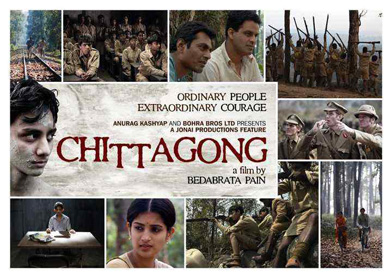
Pulkit Datta
May 23, 2012
A powerful independent film that traces a true historical story with a personal touch.
The story of India’s independence goes far deeper than the popular tales surrounding Gandhi, Jinnah and Mountbatten. The seeds of the freedom struggle were planted years before, in the most remote corners of the country, and by the unlikeliest of people. Director Bedabrata Pain’s debut film Chittagong has, unfortunately, been in the news until now for more unnecessary reasons. The film, based on the 1930 uprising that shook the British establishment in Bengal, faced competition from a much higher profile Ashutosh Gowariker film Khelein Hum Jee Jaan Sey, starring Abhishek Bachchan. While Gowariker’s film came and went without a trace, Chittagong is now finally getting its limelight. And deservedly so.
Pain’s film, co-written with Shonali Bose, is a small yet powerful film, relying on a very dependable ensemble cast and a taut story. The story is told through the eyes of Jhunku Roy (Delzad Hiwale), the scrawny privileged son of a highly regarded Anglicized Indian attorney. While he has access to anything he needs and an open door to go to London for higher education (thanks to his father’s close connections with the British colonial authorities), Jhunku is convinced by local schoolteacher Masterda Surya Sen (Manoj Bajpai) to go in a very different direction.
Bajpai plays a calm and understated leader, only rarely slipping into preaching. As Masterda, he assembles a core team of resistors, who then recruit a group of untrained teenage boys and girls to gradually form the resistance movement. Jhunku thus becomes the youngest and most unlikely fighter in this struggle. As Jhunku constantly battles his internal conflict between loyalty to his family and loyalty for the greater cause, he participates in various missions of growing intensity for Masterda, all leading up to the grand plan of raiding the local British armory.
Director Pain makes the tensions between the characters very tangible. Several confrontations – between Jhunku and his father, Jhunku and Masterda, and Masterda and the British authorities – are layered, intense and thrust the story forward. The stark contrast between the inexperienced teenagers wielding weapons and the British military is also gripping, especially when you remember that the film is based on true events. However, what eventually draws the film back from becoming a historical epic is its treatment. The emotions of the characters are deep, their fears palpable and their struggle visible, but it all seems very contained. In the end, Chittagong is an experience of a very localized series of events, careful not to insinuate that the events had any impact in the rest of the country. The fights remain local, and the consequences remain local as well. In that sense, the film is effective in its storytelling, but it falls short of becoming a film that reverberates on. But then again, a historical film doesn’t always have to be an epic.
The casting of the film elevates the film tremendously. Bajpai is a leader that maintains his sway while hardly resorting to melodramatics or grand gestures. Delzad Hiwale as Jhunku also puts in a strong performance, playing the feeble 14 year old, boy turning into man, with convincing gusto. The supporting cast, comprising Nawazuddin Siddiqui, Raj Kumar, Vijay Varma and Vega Tamotia, form a group of fresh faces that work well together. Barry John, as the local British governor, adds depth to what could have easily become a caricatured colonial British character, that many films of this genre fall prey to. Instead, John displays a range of emotions, teetering between human sympathy and duty to the crown.
The music, by Shankar-Ehsaan-Loy, is also worth mentioning. The trio provide a sweepingly emotional score, enhancing several of the scenes. The climactic song is especially powerful, as the story is wrapped up and connected to the real players, and the director injects a very personal touch that was a significant part of the long and arduous making of the film.
With Chittagong, director Bedabrata Pain makes a confident transition to filmmaking after 18 years of being a very successful research scientist and engineer. Pain tells a historical story in a personal, simple and emotional way. He is also helped tremendously by a very able team of cast and crew that package the film into a powerful example of independent cinema coming out of India. If not for all its technical and narrative plusses, Chittagong is worth watching because it comes off as a truly heartfelt effort in independent filmmaking.
Watch Chittagong at the New York Indian Film Festival 2012. More information here.
|

